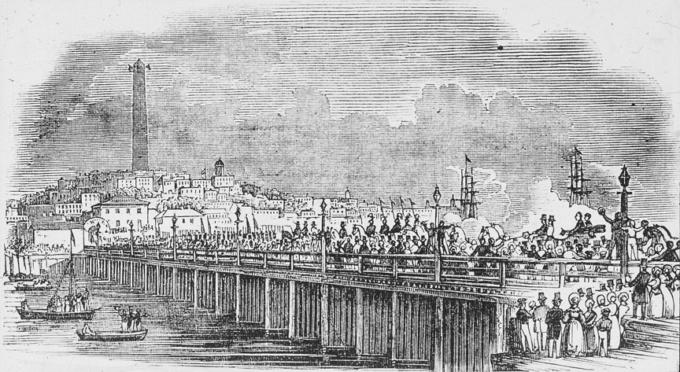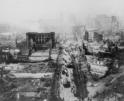
Culture

The ringing of bells sounded throughout Boston on June 16, 1843, as the city prepared to welcome the arrival of John Tyler, the 10th president of the United States. The following day marked the "celebration of the Battle of Bunker Hill" in which "The Military and different societies turn(ed) out to escort the President of the U. States to Bunker Hill," wrote Bishop Benedict Fenwick in his journal. On June 17, on the 68th anniversary of the battle, President Tyler, Bishop Fenwick, and a crowd of over 100,000 proud citizens honored their heritage at the celebration of the completion and grand opening of the Bunker Hill Monument.
According to Bishop Fenwick, the celebrations began in the morning as the "procession formed at the State house at 9 O'clk (sic.) ... Owing to the difficulty of forming and length of the Procession as well as the length of the discourse, it was nearly six O'clk (sic.) in the afternoon before the return of the Societies."
The duration of the celebration and the sizable crowd highlight the importance of the legacy of the Battle of Bunker Hill. The battle, which took place on June 17, 1775, between the British and the colonial forces in America, resulted in a loss for the colonies but sent a powerful message to the British of the revolutionary pride of the colonists. The conflict became a symbol of freedom for early Americans as it marked one of the first battles fought for civil and religious liberty in America. The significance of the battle was recognized early, as the Bunker Hill Monument Association formed in 1823 to preserve the battlefield and build a monument to honor the historical event. The construction of the monument began in 1827, but was stopped and restarted numerous times due to financial challenges. However, 15 years after the cornerstone had been laid in 1825, the monument was completed and opened on June 17, 1843.
As the young nation grappled with its identity, the anniversary "was not merely the celebration of Massachusetts; it was a national ovation" that marked the "high and enduring capacity of a free government," The Pilot reported. This sentiment was felt deeply by those celebrating the completion of the Bunker Hill Monument, as a two-mile long parade composed of 60 military companies and numerous local societies maneuvered their way from downtown Boston to the monument. The groups that marched included the Charitable Irish Society, St. Mary's Society, Roxbury Temperance Societies, and the Roman Catholic Mutual Relief Society, who "consisting entirely of Catholics ... gave three cheers" to the bishop and clergy during their procession. Even 13 veterans who had fought at Bunker Hill were in attendance to honor the completion of the monument.
The celebratory event served as an important unifying moment of patriotism during a period of division in American politics. John Tyler, formerly the vice president of President William Henry Harrison, had ascended to the position of president upon Harrison's unexpected death in 1841, making Harrison the first president to die in office. As the constitution was in its early phases of interpretation, the concept of a president entering office without being democratically elected stirred resentment among the American public and resulted in Tyler developing the derogatory nickname "His Accidency." Reflecting the animosity of the time, the New York Herald reported that "of the hundreds of thousands who would meet him (Tyler) in this city ... there would not be 10 individuals of the whole number who do not look upon him as an unprincipled traitor" during the presidential visit to Boston.
Despite the negative perception of President Tyler at the time, the crowds in Boston gathered cheerfully to celebrate the independence and history of the young nation, largely in part due to the vast legion of Irish immigrants who gathered to show their support. Throughout the presidential visit to Massachusetts, the Irish citizens "were the foremost in yielding to the president the cordial reception due from American citizens," according to Pilot reporters. Although Tyler's actions frustrated many citizens, Irish immigrants supported him openly. The tight English rule over Ireland felt reminiscent of the colonial pressures that the early Americans had faced just 70 years before. This familiarity resulted in Tyler's support for Irish liberation, a fact that emboldened the Irish immigrant population to rally behind the president during his visit to Bunker Hill.
Numerous sources from the time remarked on the impressive show of support from the Irish. One reporter for The Pilot wrote that the Irish "presented a noble commentary upon the admiration and enthusiasm of the Irish for patriotic festivals of America, and spoke more powerfully than language can, of the true American feeling of the Irish of this Union." And, while partisan disagreement followed President Tyler through his travels north, the Irish of the Boston region "made him feel that he was in the midst of men who could forget politics in the memory of their adopted country," reported The Pilot.
The spirit of those celebrants who gathered at Bunker Hill nearly 180 years ago reflected the continued dedication to the revolutionary ideals that the colonial militia had fought for on that very hill; concepts of freedom from the tyranny of oppression and a welcoming spirit of a unified community of citizens, regardless of background. The Pilot astutely captured this sentiment in wake of the event, stating that the celebration "was a sublime spectacle from the vindication it afforded of the high and enduring capacity of a free government ... it told us that the principles which created that battle, and made crimson that mount, are still looked up to with enthusiasm ... It was a study for those who doubt the firmness and character of a people who are their own masters."
JOY ZANGHI IS AN ARCHIVIST FOR THE ARCHDIOCESE OF BOSTON.
Recent articles in the Culture & Events section
-
Boston and the nation respond to the San Francisco Earthquake of 1906Thomas Lester
-
See you in the storyLaura Kelly Fanucci
-
'Dignitas' and the mediaRussell Shaw
-
Scripture Reflection for April 14, 2024, Third Sunday of EasterDeacon Greg Kandra
-
St. Helena's House is established in the South EndThomas Lester


















